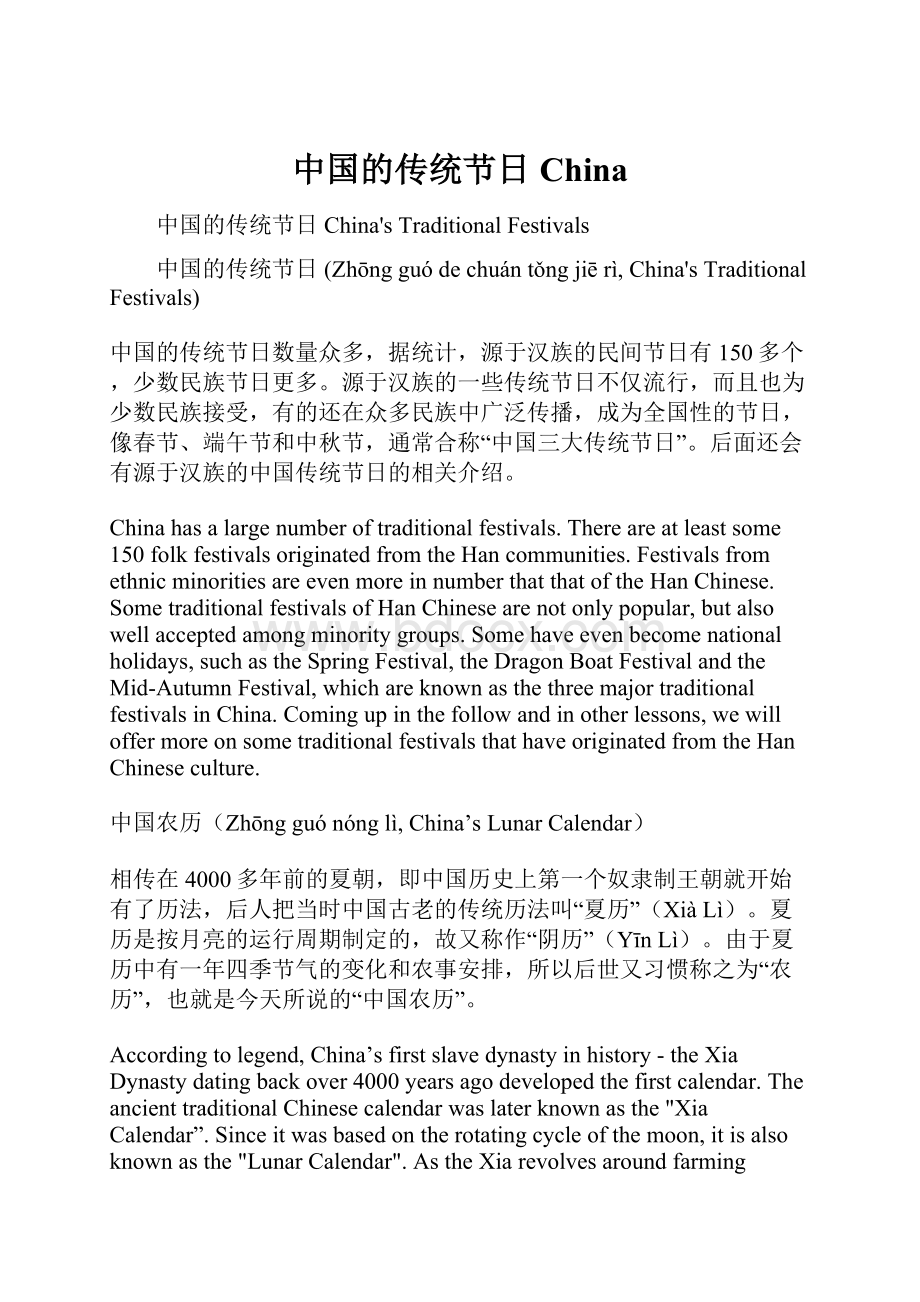中国的传统节日 China.docx
《中国的传统节日 China.docx》由会员分享,可在线阅读,更多相关《中国的传统节日 China.docx(19页珍藏版)》请在冰豆网上搜索。

中国的传统节日China
中国的传统节日China'sTraditionalFestivals
中国的传统节日(Zhōngguódechuántǒngjiērì,China'sTraditionalFestivals)
中国的传统节日数量众多,据统计,源于汉族的民间节日有150多个,少数民族节日更多。
源于汉族的一些传统节日不仅流行,而且也为少数民族接受,有的还在众多民族中广泛传播,成为全国性的节日,像春节、端午节和中秋节,通常合称“中国三大传统节日”。
后面还会有源于汉族的中国传统节日的相关介绍。
Chinahasalargenumberoftraditionalfestivals.Thereareatleastsome150folkfestivalsoriginatedfromtheHancommunities.FestivalsfromethnicminoritiesareevenmoreinnumberthatthatoftheHanChinese.SometraditionalfestivalsofHanChinesearenotonlypopular,butalsowellacceptedamongminoritygroups.Somehaveevenbecomenationalholidays,suchastheSpringFestival,theDragonBoatFestivalandtheMid-AutumnFestival,whichareknownasthethreemajortraditionalfestivalsinChina.Comingupinthefollowandinotherlessons,wewilloffermoreonsometraditionalfestivalsthathaveoriginatedfromtheHanChineseculture.
中国农历(Zhōngguónónglì,China’sLunarCalendar)
相传在4000多年前的夏朝,即中国历史上第一个奴隶制王朝就开始有了历法,后人把当时中国古老的传统历法叫“夏历”(XiàLì)。
夏历是按月亮的运行周期制定的,故又称作“阴历”(YīnLì)。
由于夏历中有一年四季节气的变化和农事安排,所以后世又习惯称之为“农历”,也就是今天所说的“中国农历”。
Accordingtolegend,China’sfirstslavedynastyinhistory-theXiaDynastydatingbackover4000yearsagodevelopedthefirstcalendar.TheancienttraditionalChinesecalendarwaslaterknownasthe"XiaCalendar”.Sinceitwasbasedontherotatingcycleofthemoon,itisalsoknownasthe"LunarCalendar".AstheXiarevolvesaroundfarmingarrangementsbasedontheseasons,itiscommonlycalled"NongLi”,literallythefarmingmooncalendar,alsoknownastheChinaLunarCalendar.
春节(Chūnjiē,TheSpringFestival)
春节,又称中国农历新年,是中国最大、最隆重的传统节日。
春节在中国农历正月初一,古称“元旦”,1911年后改称春节。
广义上说,中国的春节从每年腊月二十三或二十四“祭灶王爷”(简称“祭灶”)之日开始,往下一直延伸至正月十五的元宵节,欢度节日的时间长达近一月。
春节表示除旧迎新,除汉族以外,满、蒙、苗、壮、侗、布衣、朝鲜等20多个民族也过春节。
春节期间,各种年俗活动精彩纷呈,主要有贴春联、贴年画、剪窗花、挂福字、放鞭炮、吃年夜饭、守岁、拜年、给压岁钱、祭天祭祖、接财神等。
另外,过年大都要吃年俗食品,像饺子、年糕等等,至今仍沿古俗,且有许多口彩。
北方人习惯在除夕子时(夜里11点至12点)吃饺子,意为“岁更交子”;南方人春节喜欢吃年糕,寓意“年年高”。
TheSpringFestival,alsoknowntheChineselunarNewYear,isthelargestandmostceremonioustraditionalfestivalofChina.ThelunarnewyearfallsonthefirstdayofthefirstmonthontheChineselunarcalendar.Itwasalreadyknownasthe"NewYear"inancienttimes.After1911,itwasrenamedastheSpringFestival.Inalargersense,theChineseSpringFestivalwouldstartfromthetwenty-thirdortwenty-fourthdayofthetwelfthlunarmonth,adaywhenpeopleoftenbegintoofferprayerstothe“GodofKitchen”.Fromthenon,thefestivalwoulddragonuntilthefifteenthdayofthefirstlunarmonth,i.e.,theLanternFestival.Thetimetocelebratethefestivalalwayslastsab0utamonth.TheSpringFestivalisatimetosaygoodbyetothepastyearandwelcometheNewYear.OtherthantheHan,some20othernationalitiesliketheManchurian,Mongolian,Miao,Zhuang,Dong,Buyi,andKoreanalsocelebratetheSpringFestival.Duringthefestival,peopleobservevarioustraditions,suchasputtingupcoupletsandnewyearpaintings,makingwindowpapercuttings,hangingupacharacterofHappiness,settingofffirecrackers,eatinglunarnewyearevedinner,stayingupfortheNewYear,offeringnewyearprayersforfamilymembersandfriends,givingluckymoney,worshipinggodsandancestors,andwelcomingbacktheGodofKitchen.Inaddition,duringtheChineselunarNewYear,foodssuchasdumplingsandricecakesarestilleatentomarktheoccasion.PeopleinthenorthusedtohavedumplingsatmidnightonNewYear'sEve(between23:
00and24:
00),whichmeans"theoldyearchangesforthenewatthetimeofeating‘Jiaozi’,orthetimeperiodofZiShu,literally,thehoursofRat”.Whilethesouthernersenjoyricecakeswhichimpliesthat“ricecakesorthenewyearcakewillbringthemfurthersuccess”.
十二生肖theTwelveZodiacs
十二生肖(shíèrshēngxiāo,theTwelveZodiacs)
十二生肖,是中国古代纪年用的一组动物图像,由十一种源于自然界的动物–“鼠、牛、虎、兔、蛇、马、羊、猴、鸡、狗、猪”加中国传说中的“龙”组成。
十二生肖与中国农历中的“十二地支”搭配后的排列顺序为“子鼠、丑牛、寅虎、卯兔、辰龙、巳蛇、午马、未羊、申猴、酉鸡、戌狗、亥猪”。
其中狗排位第十一。
很多西方人把生肖看作是中国的“星座”。
基于一个12年的循环,每一年都有一个动物作为象征。
生肖在古代还被用作代表一天的时间,也就是我们所说的时辰。
一天有12个时辰,每个时辰为现在的两个小时,子时是十二个时辰中的第一时辰(即23点整至凌晨1点整),与子时相配合的动物是子鼠。
根据中国的传统哲学,人出生在某个时辰,通常被认定为本性中带有某种动物的原始特性,如:
老鼠代表智慧,牛代表勤奋,老虎代表勇猛,兔子代表谨慎,龙代表威猛,蛇代表柔韧,马代表勇往直前,羊代表和顺,猴子代表敏捷,鸡代表恒定,狗代表忠诚,猪代表随和。
总而言之,所有这些有关于生肖的含义也都来自古人对后代的美好祝愿。
Speakingofdogs,wenaturallyneedtomentionthe“TwelveZodiacs”thatrepresenttraditionalChineseculture.The“TwelveZodiacs”areagroupofanimalimagesusedinancientChinesealmanacs.Theyarecomposedofelevenanimalsfromnature-"rat,ox,tiger,rabbit,snake,horse,sheep,m0nkey,rooster,dog,pig,"andaChineselegendarycomponent-"Dragon".TheZodiacsusedtocombinetogetherwiththe"TwelveEarthlyBranches"intheChineseLunarcalendarandusuallyform12pairgroupsinsequence,including"Zisu(rat),Chouniu(ox),Yinhu(tiger),Maotu(rabbit),Chenlong(dragon),Sishe(snake),Wuma(horse),Weiyang(sheep),Shenhou(m0nkey),Youji(rooster),Xugou(dog)andHaizhu(pig)".Amongthese,thedogrankstheeleventh.ManyWesternerstakeChinesezodiacsasChina’s"Constellations"or“Horoscopes”.Basedona12-yearcycle,eachyearhasananimalasitssymbol.Inancienttimes,zodiacswerealsousedtorepresentdifferenttimeperiodsoftheday,whatwecall“ShiChen”,literallythe“timeperiods”.InChineselunarcalendar,thereare12timeperiodsaday,andeverytimeperiodincludestwohours.“Zishi”,ormidnighttime,isthefirstofthetwelvetimeperiods(i.e.from23:
00to01:
00),andthezodiacanimalthatmatchesitisrat.AccordingtotraditionalChinesephilosophy,onewhowasborninacertaintimeperiodisusuallyidentifiedhavingthenatureofthezodiacanimal.Forinstance,ratsymbolizeswisdom;ox,hardwork;tiger,braveryandcourage;rabbit,prudence;dragon,braveryandpower;snake,flexibility;horse,courageandfearlessness;sheep,softnessandharmony;m0nkey,cleverness;chicken,constancy;dog,loyalty;andpig,easy-going.Inshort,alloftheseconnotationsforzodiacswerederivedfromthegoodwishesofancientChinesefortheirlatergenerations.
千金WhatisWorth"AThousandPiecesofGold?
"
千qiān:
Thousands,thousandsof;indicatingmany.
金jīn:
Gold;ormoney.
Thistermreferstosomethingthatisextremelyprecious,liketimeoraspecialperson.It'salsoarespectfulformofaddressingsomeone'sdaughterorunweddedyoungwoman.
千金(qiānjīn):
字面意思指某件事物很宝贵,比如时间、物件或人。
千金也是对别人家女儿或者未婚女子的敬称。
词语溯源Howitcametobe:
ThereisastorybehindthewordQianJin;itoriginatesfromthelegendofWuZixu,apoliticianoftheWukingdomduringtheSpringandAutumnPeriod(722–481BC).HefledtothestateofWutoescapepersecutionfromtheKingofChu.Hewassavedbyayoungwomanandwarnedhernottorevealhisidentity.Legendhasitthatthewomanjumpedintoariveranddrownedherselftokeepherpromiseofsecrecy.Wugrievedforherandwrote"Ishallrepayyourkindnesswithin10years"withhisbloodonanearbystone.Yearslater,Wubecameministerofthekingdomtowhichhefledandbuiltagoldstatueoftheyoungladybesidetheriverwhereshedrownedtohonorhersacrifice.Fromthenon,QianJinbecametherespectfulformtoaddressanother'sdaughterorunweddedyounglady.
千金这个词背后,有一个非常感人的故事。
相传春秋战国时期,伍子胥因为政治迫害逃离楚国,投奔吴国,途中得到了一位少女的救助。
伍子胥告诫少女此事要保密,少女为获信任,投江自尽。
伍子胥为此伤感不已,在石上血书:
“十年之后,千金报德!
”几年后伍子胥任宰相,特地在江边用黄金塑少女像纪念她。
所以"千金"就成了对未婚女子的敬称。
如何使用Howtouseitinasentence:
qīngchūnbǎoguì,qiānjīnnánmǎi
青春宝贵,千金难买
Youthismorepreciousthanathousandpiecesofgold
nínyǒujǐwèiqiānjīn?
您有几位千金?
Howmanydaughtersdoyouhave?
(Respectfulformtorefertoanother'sunweddeddaughter)
qiānjīndàxiǎojiě
千金大小姐
Fairlady(Unweddedyounglady)
年味十足的传统习俗PreparefortheChineseSpringFestival
2014SpringFestivalfallsonJanuary31.TheholidayinChinastartsfromJanuary31toFebruary6,2014.ItistheYearoftheHorseaccordingtoChinesezodiac.
2014年农历春节是1月31号。
这次春节假期从1月31日延续到2月6日。
根据中国生肖算法,2014年是马年。
ChineseSpringFestival,alsocalledLunarNewYear,hasmorethan4,000yearsofhistory.BeingoneofthetraditionalChinesefestivals,itisthegrandestandthemostimp0rtantfestivalforChinesepeople.Itisalsothetimeforthewholefamiliestogettogether,whichissimilarwithChristmasDaytothewesterners.OriginatingduringtheShangDynasty(ab0ut17th-11thcenturyBC),SpringFestival,whichcelebratesfamilyreunio,isfullofrichandcolorfulactivities,andhopeswiththeadventofspringandflowersblossoming.Peoplefromdifferentregionsanddifferentethnicgroupscelebrateitintheiruniqueways.
中国的春节,也被称为农历新年,迄今已有四千多年的历史。
对于中国人来说,这是规模最大,最重要的传统节日。
就如同西方的圣诞节一样,春节是一家团聚的日子。
春节起源于商朝(公元前11-17世纪),为了庆祝全家团圆和表达对春暖花开的期盼,节日期间会准备丰富多彩的活动。
不同地区和不同少数民族人们会用自己独特的方式庆祝这一传统节日。
FestivalTime
节日时长
ItcomesonthefirstdayofChineselunarcalendarandlastsforalmosthalfofamonth.Butinfolkcustom,thistraditionalholidaylastsfromthe23rddayofthetwelfthmonthtothe15thdayofthefirstmonth(LanternFestival)inthelunarcalendar.Amongthesedays,theNewYear’sEveandthefirstdayoftheNewYearisthepeaktime.Theexactdaysaredifferentineveryyearaccordingtothelunarcalendar.
春节从农历新年第一天开始,几乎要持续一整个月。
但在民间传统中,这一节日从腊月23日就开始了,直到正月十五(元宵节)。
在这些天里,除夕和春节第一天是最热闹的时候。
根据农历,每年除夕和春节所在的公历日期都有所不同。
History
春节由来
ItissaidthatthecustomofSpringFestivalstartedinwhenpeopleofferedsacrificetoancestorsinthelastmonthofChineselunarcalendar.Atthattime,peoplepreparedthesacrificebydoingthoroughcleaning,havingbathesandsoon.Later,peoplebegantoworshipdifferentdeitiesaswellonthatday.Itisthetimethatalmostallthefarmworksweredoneandpeoplehavefreetime.Thesacrificingtimechangedaccordingtothefarmingscheduleandwasnot